

The Misconceptions About Hair Loss: Debunking Myths and Finding Facts is a comprehensive guide that delves into the various myths and misconceptions surrounding hair loss, providing evidence-based information for a comprehensive understanding. Many people suffer in silence, believing outdated myths that hinder effective treatment and prevention. This guide aims to shed light on these misconceptions and arm readers with the facts to take proactive steps towards hair health. This guide will cover several aspects contributing to hair loss, dissecting the root causes and exploring possible preventative measures. It will also discuss effective treatments and highlight resources for further support. The structure of this article will be as follows…
Unveiling the Mysteries of Hair Loss: A Comprehensive Overview
Common Myths and Misconceptions
Hair loss is a common concern for many individuals, leading to a host of myths and misunderstandings. These misconceptions can prevent individuals from seeking appropriate treatment or making informed choices about their hair health. One pervasive myth is that hair loss is solely a male concern. In reality, women also experience hair loss, and the causes can vary significantly from individual to individual. A lack of understanding of the actual causes of hair loss hinders individuals from effectively managing and addressing the issues properly. This comprehensive guide aims to shed light on these misconceptions and deliver reliable information for a deeper comprehension of the topic.
Common Myths & Scientific Evidence
Many people believe that certain foods or dietary habits directly cause hair loss, a false assumption. While healthy nutrition supports overall health, including hair, isolated dietary choices are usually not the sole cause of hair loss. Equally prevalent is the misconception that stress is the sole cause of hair loss. While stress can play a role, it’s not always the primary factor, and often a symptom of an underlying issue. A balanced approach is key for understanding the multifaceted nature of hair loss and uncovering the truth beneath the myths.
The Role of Genetics and Hormones
Unraveling the Genetic Link
Hereditary factors play a significant role in hair loss patterns. Male pattern baldness (androgenetic alopecia) is a common example of how genetic predisposition influences hair loss. Research has highlighted that genes associated with increased levels of dihydrotestosterone (DHT) can lead to hair follicle shrinkage. This illustrates how genetics can contribute to the development of hair loss in certain individuals.
The Influence of Hormones
Hormonal changes during pregnancy, menopause, or even puberty can affect hair growth cycles. Fluctuations in hormone levels can lead to temporary or prolonged hair loss in women. For example, childbirth can alter hormone levels and sometimes lead to an increase in hair loss. Recognizing the effects of fluctuating hormones can be critical in understanding hair loss patterns. Recognizing the interplay between genetics and hormones is a vital step to comprehending the nuances of hair loss.
Nutritional Deficiencies and Hair Loss
Essential Nutrients for Hair Growth
Nutritional deficiencies can contribute to hair loss. A diet lacking essential vitamins and minerals, such as iron, vitamin D, and biotin, can impair hair follicle health and ultimately lead to hair thinning. Studies have linked iron deficiency to hair loss, underscoring the vital role of a balanced diet in promoting healthy hair growth.
Dietary Factors and Hair Health
Excessive intake of processed foods, or unbalanced nutrition, can have a detrimental impact on hair health. Focusing on a diet rich in protein, vitamins, and minerals will contribute positively to overall hair health. Adequate protein intake is fundamental for hair growth and repair, so a balanced nutritional regime is a key aspect of managing hair loss concerns.
Stress and its Impact on Hair Loss
The Stress-Hair Loss Connection
Chronic stress can disrupt the hair growth cycle, potentially leading to temporary hair shedding. Elevated levels of cortisol, a stress hormone, have been linked to hair loss in some individuals. Studies have shown a correlation between significant life stressors and an increase in hair shedding.
Coping Strategies and Hair Health
Managing stress through healthy coping mechanisms is vital in maintaining overall health. Practicing mindfulness techniques or engaging in regular exercise are examples of effective ways to manage stress levels and potentially mitigate stress-related hair loss. While stress may play a factor, it is important to consider other possible root causes.
Hair Loss Treatments and Management
Medical Treatments and Interventions
Medical interventions, such as medication, can be used to treat or manage hair loss. Minoxidil and finasteride are two common medications often prescribed to promote hair growth. Properly identifying the underlying causes is vital for determining an appropriate treatment.
Lifestyle Changes and Home Remedies
Lifestyle changes, such as adjusting diet and adopting stress-reduction techniques, may be helpful in managing hair loss. Exploring home remedies can also be a useful complementary approach to hair loss management. However, it is critical to consult with a dermatologist to determine the best approach and consider other potential underlying causes before implementing a specific treatment.
Frequently Asked Questions
What are the early signs of hair loss?
Early signs of hair loss can vary depending on the underlying cause. Some common indicators include noticeable thinning in specific areas, increased shedding (particularly in the shower or upon combing), and visible patches of hair loss. Regular self-examination and awareness of any changes in hair patterns are crucial. Consulting a professional is important in evaluating the cause of these changes.
How can I prevent hair loss?
Preventing hair loss involves adopting a holistic approach. This includes maintaining a healthy diet rich in essential vitamins and minerals, managing stress effectively, and considering any underlying medical conditions that may be contributing to hair loss. Consulting with a healthcare professional can help in developing a targeted prevention plan.
In conclusion, understanding the misconceptions surrounding hair loss is crucial for effective management and treatment. By debunking myths and seeking accurate information, individuals can make informed decisions about their hair health and well-being. This understanding empowers them to address hair loss concerns effectively, preventing unnecessary stress and promoting a healthier outlook. Consult a dermatologist or trichologist for personalized guidance and treatment options that align with your specific circumstances. For further resources and personalized support, visit [website address] or contact our team today.